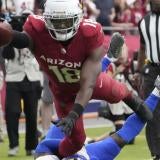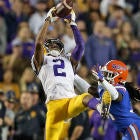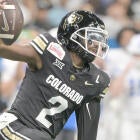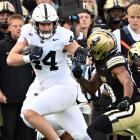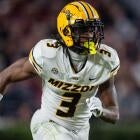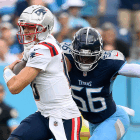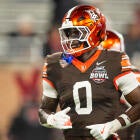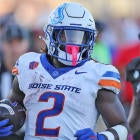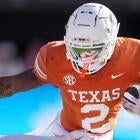Justin Jefferson was wildly productive in his final season, catching 111 passes for 1,540 yards and 18 scores from Joe Burrow. It's fair to assume his production was elevated by a great situation, but how much? Averaging more than seven catches and one score per game can never be posed as a bad thing, but when we adjust for the volume in LSU's breakout offense, those numbers look a little different. Does Jefferson have elite potential at the next level, or is his true ceiling not quite that high?
Numbers to Know
Date of Birth: January 16, 1999
Height: 6 feet 1 inch
Weight: 202 pounds
Hand: 9 1/8 inches
Arm: 33 inches
40 time: 4.43 seconds
Vertical leap: 37.5 inches
Prospect Stats
2019: 15 games, 111 receptions, 1540 receiving yards (26% share), 18 TD
Jefferson was a true junior in 2019, and put up huge numbers at 20 years of age, including a 14-227-4 line in the national semifinal matchup with Oklahoma. Because of how strong the LSU offense was, Jefferson's share of the team's receiving yardage fell short of the 30% benchmark we're typically looking for, and he actually trailed LSU's leading receiver Ja'Marr Chase by 240 yards. Still, a 26% share isn't bad, and the strength of LSU's offense both in terms of total production and the skill around Jefferson makes it hard to imagine how much more productive he could have been in his slot receiver role.
2018: 13 games, 54 receptions, 875 receiving yards (29% share), 5 carries, 26 rushing yards, 6 TD
One of the wildest stats of the 2020 class is that Jefferson's 875 yards as a sophomore accounted for a higher percentage of LSU's passing offense in 2018 than his 1,540 yards did in 2019. As a team, LSU more than doubled its passing yardage, going from just under 3,000 yards in 2018 to just over 6,000 last year. When we control for that team context, a strong case can be made that Jefferson didn't actually take as big of a final year leap as his numbers suggest, and was instead a solid producer for two consecutive years in extremely different atmospheres — a positive note for his profile.
Career: 30 games, 165 receptions, 2415 receiving yards (26% share), 24 total TD
Jefferson hardly played as a true freshman, but his career numbers are solid, and being an early declare is another plus in his profile.
Known Injury History
- Ankle, September 2019 (left Vanderbilt game early, didn't miss additional time)
Strengths
A well-rounded receiver, Jefferson was productive on the outside as a true sophomore before moving inside last year, displayingve rsatility that should make him a fit in any offense. His ball skills are often cited as a strength — one that translates to any receiver role.
Jefferson's 40-yard dash time and vertical and broad jumps also checked the requisite athletic boxes at the Combine when he showed impressive athleticism.
Concerns
There aren't a ton of concerns with Jefferson, who seems likely to be productive in some capacity at the next level. The question is whether he has true No. 1 ability, and the biggest issue could be his physicality. At 6-1, 202, Jefferson isn't the biggest receiver, and per PFF he didn't see much press coverage last year out of the slot and was frequently knocked off his route by contact.
Chris Trapasso's Take
No. 8 WR
Jefferson played second fiddle to Biletnikoff winner Ja'Marr Chase in LSU's legendarily prolific passing offense quarterbacked by Joe Burrow, and repeatedly was found on deep crossers, slants, and screens during the Tigers' perfect, national-title winning season.
Jefferson is lanky-ish and plays with a basketball style against press coverage, attempting to win with shoulder fakes and wide crossover moves instead of hand use, efficient steps or power. Despite the gigantic outburst in receiving production... much of his production was schemed, (and) brilliant play designs and RPOs got him open for Burrow to find him.
Fantasy Comparison
I think Jefferson makes more sense as a No. 2 than a true alpha who can handle shadow coverage from the NFL's best corners, so the upside comparisons for me are some of the successful, young No. 2s around the league. Michael Gallup and Calvin Ridley make sense, while Will Fuller is more of a deep threat than Jefferson and Chris Godwin is a pie-in-the-sky comp, but they similarly fit the bill as successful No. 2s operating in high-powered offenses.
All of those are optimistic comps, though, and based on fit we might also find Jefferson to be a bit underwhelming if still Fantasy-relevant, perhaps similar to Marvin Jones or Mike Williams' career to date.
Favorite Fantasy Fits
The best fits are places where Jefferson could step into a significant role behind a legit No. 1 with an above average quarterback capable of sustaining two productive receivers. The Packers are perfect in that regard, and the Colts would also be a strong fit despite Parris Campbell's presence as the likely slot receiver. In either place, Jefferson would have the potential to earn 80-100 targets as a rookie, while Philadelphia — where he's frequently mocked — is another place he could make an immediate impact.
Fantasy Bottom Line
Jefferson's raw final year production was off the charts, but he wasn't even the best receiver in his own offense. How much of a knock that should be is open to interpretation, and Jefferson's sophomore year production is likely underrated and speaks to a versatile and well-rounded profile. There's likely NFL success in his future, but the biggest question is whether he's physical enough to be a true No. 1.
![[object Object] Logo](https://sportshub.cbsistatic.com/i/2020/04/22/e9ceb731-8b3f-4c60-98fe-090ab66a2997/screen-shot-2020-04-22-at-11-04-56-am.png)







